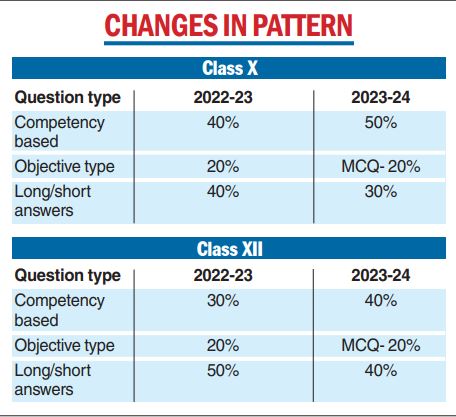More MCQs in CBSE exams


Students taking the CBSE’s Class X and Class XII board exams in 2024 will be set more multiple-choice-type questions (MCQs).
They will also have to answer questions set from paragraphs given on the question paper.
Academics were divided over the changes. One schoolteacher expressed concern that students would now be encouraged further to eschew in-depth learning, while another said the changes would help wean the students away from rote learning.
Currently, “competency-based questions (CBQs)” — asked in the form of MCQs — account for 40 per cent of the total marks in the theory paper in any subject in the CBSE’s Class X exams. This will be raised to 50 per cent.
In Class XII, the proportion of CBQs will rise from 30 per cent to 40 per cent.
Also, objective-type questions demanding one-sentence answers account for 20 per cent marks in each paper. Now the term “objective type” has been replaced with “selective response type (MCQ)”.
Educationist Usha Ram, former principal of Laxman Public School, said the new nomenclature suggests that the selective response type questions may contain some MCQs, too. She said that while the total marks accorded to short and long-answer questions will decrease by 10 percentage points, the number of the questions may not.
“The marks assigned to each question may be reduced marginally. This will help students reflect on both subjective questions and MCQs,” she said.
A teacher said that subjective-type questions help assess a student’s understanding better. “The new question pattern will encourage most students to focus on short-answer questions and MCQs. This will take them away from in-depth learning further,” he said.
Another teacher said the students would not be able to obtain any answer directly from the given paragraphs.

“The student will get certain basic information from the paragraphs but will have to link it with related concepts to be able to answer the questions asked,” the teacher said.
Sudha Acharya, principal of the ITL Public School here, said the CBSE question papers were being changed to match the patterns of entrance tests such as the Common University Entrance Test, Joint Entrance Examination and the National Entrance-cum-Eligibility Test. “Assessment has been aligned with competency-based education. There is a shift from rote learning to application-based assessment,” Acharya said.
In a circular issued recently, the CBSE had said the changes had been brought in because the National Education Policy stressed the need to move away from rote learning towards creative and critical thinking.
“Therefore, in the forthcoming session, a greater number of competency-based questions, or questions that assess (the) application of concepts (to) real-life situations, will be part of the question paper,” the circular said.